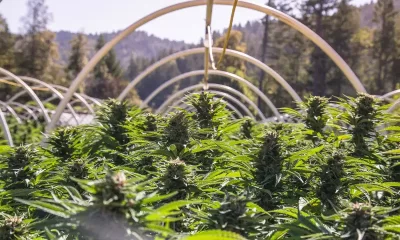Cultivation
California Will Allow Large Cultivation Licenses

On January 1, 2023, California’s Department of Cannabis Control (DCC) will begin accepting applications for large cultivation licenses for the first time ever. California law authorized large cultivation licenses years ago. But, the law caveat was that applicants could not apply for large cultivation licenses until 2023. And on June 17, the DCC announced it was proposing regulations to start the large cultivation license application process next year. Today I’ll explore some of the key highlights of large cultivation licenses.
What sizes of cultivation licenses does California allow?
California divides licenses into three categories: outdoor, indoor, and mixed-light. For each different type, there are multiple different licenses based generally on canopy size. The smallest are specialty, followed by small, then medium. The state assigned each license a type number. For example, Type 1B is a Specialty Mixed-Light license and type 3A is a Medium Indoor license. Medium licenses are the biggest, and can include up to 22,000 square feet of canopy (area where mature plants grow) for indoor and mixed-light, or up to 1 acre of canopy for outdoor. There is also a nursery license (Type 4) for applicants that produce propagative materials.
Up until now, an applicant could not own more than one medium license. So lots of larger farms or indoor operations would “stack” one medium license and many small licenses on the same farm or facility. This is a very onerous process because it would require licensees to obtain and maintain, in some cases, dozens and dozens of licenses. And to make matters worse, recent regulations attempted to stamp out applicants’ ability to secure stacked licenses in a single facility or farm.
Why large cultivation licenses are special
Here’s how the DCC’s proposed regulations define the three types of large cultivation licenses:
(1) “Large Outdoor” is an outdoor cultivation site with more than one acre of total canopy.
(2) “Large Indoor” is an indoor cultivation site with more than 22,000 square feet of total canopy.
(3) “Large Mixed-Light” is a mixed-light cultivation site with more than 22,000 square feet of total canopy.
As you can see, these licenses include anything bigger than medium. This is good news to folks who are stacking presently and want to minimize the intense regulatory burden of having dozens of licenses in one facility.
To make life easier on cultivators, DCC will allow licensees to combine existing cultivation licenses into either medium or large cultivation licenses for currently licensed properties so long as the holder of the combined licenses is the same person that held the pre-existing licenses. The holder must submit an application along with certain application documents. There won’t be a separate application fee for conversion, though the fees for large cultivation licenses will be somewhat complicated.
How do large cultivation license fees work?
Applications for large cultivation licenses will have the following fees:
- Large Outdoor License – $1,555
- Large Mixed Light Tier 1 License – $2,885
- Large Mixed Light Tier 2 License – $4,945
- Large Indoor License – $8,655
Keep in mind that these are just the application fees, not the annual license fees. Annual license fees for large cultivation licenses are going to be potentially very expensive:
- Large Outdoor License – Base annual fee of $13,990 plus $640 per 2,000 square feet of canopy over 1 acre
- Large Mixed Light Tier 1 License – Base annual fee of $25,970 plus $2,360 per 2,000 square feet of canopy over 22,000 square feet
- Large Mixed Light Tier 2 License – Base annual fee of $44,517 plus $4,040 per 2,000 square feet of canopy over 22,000 square feet
- Large Indoor License – Base annual fee of $77,905 plus $7,080 per 2,000 square feet of canopy over 22,000 square feet
These licenses are not going to be cheap. It’s conceivably possible that some of these license may have annual fees well into six figures. Applicants eyeing large licenses will need to get their calculators out early, as these fees will be significant.
One other point here – fee structures for large cultivation licenses will get even more complicated during conversion. At the time of conversion, there will necessarily be some active licenses. So the proposed rules say that ” if time remains on any of the licenses to be converted, the prorated value for each day remaining on each license approved for conversion will be credited to the license fee amount for the converted license. The amount credited shall not exceed the license fee for the converted license.” The good news is that we’ll see proration. The bad news is that calculating it could be difficult and it’s not clear what would happen if the applicant and DCC disagree on the calculation.
Prohibitions for large cultivation license holders
The proposed rules state that large license holders are not eligible to apply for or hold Type 8 (testing lab), Type 11 (distributor), or Type 12 (microbusiness) licenses. The prohibition on holding a Type 8 is no surprise – that’s already the case now. But many cultivators also hold distributor licenses and some may hold microbusiness licenses, so things will start to get complicated for those folks.
Source: https://harrisbricken.com/cannalawblog/california-will-allow-large-cultivation-licenses/
Business
New Mexico cannabis operator fined, loses license for alleged BioTrack fraud

New Mexico regulators fined a cannabis operator nearly $300,000 and revoked its license after the company allegedly created fake reports in the state’s traceability software.
The New Mexico Cannabis Control Division (CCD) accused marijuana manufacturer and retailer Golden Roots of 11 violations, according to Albuquerque Business First.
Golden Roots operates the The Cannabis Revolution Dispensary.
The majority of the violations are related to the Albuquerque company’s improper use of BioTrack, which has been New Mexico’s track-and-trace vendor since 2015.
The CCD alleges Golden Roots reported marijuana production only two months after it had received its vertically integrated license, according to Albuquerque Business First.
Because cannabis takes longer than two months to be cultivated, the CCD was suspicious of the report.
After inspecting the company’s premises, the CCD alleged Golden Roots reported cultivation, transportation and sales in BioTrack but wasn’t able to provide officers who inspected the site evidence that the operator was cultivating cannabis.
In April, the CCD revoked Golden Roots’ license and issued a $10,000 fine, according to the news outlet.
The company requested a hearing, which the regulator scheduled for Sept. 1.
At the hearing, the CCD testified that the company’s dried-cannabis weights in BioTrack were suspicious because they didn’t seem to accurately reflect how much weight marijuana loses as it dries.
Company employees also poorly accounted for why they were making adjustments in the system of up to 24 pounds of cannabis, making comments such as “bad” or “mistake” in the software, Albuquerque Business First reported.
Golden Roots was fined $298,972.05 – the amount regulators allege the company made selling products that weren’t properly accounted for in BioTrack.
The CCD has been cracking down on cannabis operators accused of selling products procured from out-of-state or not grown legally:
- Regulators alleged in August that Albuquerque dispensary Sawmill Sweet Leaf sold out-of-state products and didn’t have a license for extraction.
- Paradise Exotics Distro lost its license in July after regulators alleged the company sold products made in California.
Golden Roots was the first alleged rulebreaker in New Mexico to be asked to pay a large fine.
Source: https://mjbizdaily.com/new-mexico-cannabis-operator-fined-loses-license-for-alleged-biotrack-fraud/
Business
Marijuana companies suing US attorney general in federal prohibition challenge

Four marijuana companies, including a multistate operator, have filed a lawsuit against U.S. Attorney General Merrick Garland in which they allege the federal MJ prohibition under the Controlled Substances Act is no longer constitutional.
According to the complaint, filed Thursday in U.S. District Court in Massachusetts, retailer Canna Provisions, Treevit delivery service CEO Gyasi Sellers, cultivator Wiseacre Farm and MSO Verano Holdings Corp. are all harmed by “the federal government’s unconstitutional ban on cultivating, manufacturing, distributing, or possessing intrastate marijuana.”
Verano is headquartered in Chicago but has operations in Massachusetts; the other three operators are based in Massachusetts.
The lawsuit seeks a ruling that the “Controlled Substances Act is unconstitutional as applied to the intrastate cultivation, manufacture, possession, and distribution of marijuana pursuant to state law.”
The companies want the case to go before the U.S. Supreme Court.
They hired prominent law firm Boies Schiller Flexner to represent them.
The New York-based firm’s principal is David Boies, whose former clients include Microsoft, former presidential candidate Al Gore and Elizabeth Holmes’ disgraced startup Theranos.
Similar challenges to the federal Controlled Substances Act (CSA) have failed.
One such challenge led to a landmark Supreme Court decision in 2005.
In Gonzalez vs. Raich, the highest court in the United States ruled in a 6-3 decision that the commerce clause of the U.S. Constitution gave Congress the power to outlaw marijuana federally, even though state laws allow the cultivation and sale of cannabis.
In the 18 years since that ruling, 23 states and the District of Columbia have legalized adult-use marijuana and the federal government has allowed a multibillion-dollar cannabis industry to thrive.
Since both Congress and the U.S. Department of Justice, currently headed by Garland, have declined to intervene in state-licensed marijuana markets, the key facts that led to the Supreme Court’s 2005 ruling “no longer apply,” Boies said in a statement Thursday.
“The Supreme Court has since made clear that the federal government lacks the authority to regulate purely intrastate commerce,” Boies said.
“Moreover, the facts on which those precedents are based are no longer true.”
Verano President Darren Weiss said in a statement the company is “prepared to bring this case all the way to the Supreme Court in order to align federal law with how Congress has acted for years.”
While the Biden administration’s push to reschedule marijuana would help solve marijuana operators’ federal tax woes, neither rescheduling nor modest Congressional reforms such as the SAFER Banking Act “solve the fundamental issue,” Weiss added.
“The application of the CSA to lawful state-run cannabis business is an unconstitutional overreach on state sovereignty that has led to decades of harm, failed businesses, lost jobs, and unsafe working conditions.”
Business
Alabama to make another attempt Dec. 1 to award medical cannabis licenses

Alabama regulators are targeting Dec. 1 to award the first batch of medical cannabis business licenses after the agency’s first two attempts were scrapped because of scoring errors and litigation.
The first licenses will be awarded to individual cultivators, delivery providers, processors, dispensaries and state testing labs, according to the Alabama Medical Cannabis Commission (AMCC).
Then, on Dec. 12, the AMCC will award licenses for vertically integrated operations, a designation set primarily for multistate operators.
Licenses are expected to be handed out 28 days after they have been awarded, so MMJ production could begin in early January, according to the Alabama Daily News.
That means MMJ products could be available for patients around early March, an AMCC spokesperson told the media outlet.
Regulators initially awarded 21 business licenses in June, only to void them after applicants alleged inconsistencies with how the applications were scored.
Then, in August, the state awarded 24 different licenses – 19 went to June recipients – only to reverse themselves again and scratch those licenses after spurned applicants filed lawsuits.
A state judge dismissed a lawsuit filed by Chicago-based MSO Verano Holdings Corp., but another lawsuit is pending.
Source: https://mjbizdaily.com/alabama-plans-to-award-medical-cannabis-licenses-dec-1/
-

 Business2 years ago
Business2 years agoPot Odor Does Not Justify Probable Cause for Vehicle Searches, Minnesota Court Affirms
-

 Business2 years ago
Business2 years agoNew Mexico cannabis operator fined, loses license for alleged BioTrack fraud
-

 Business2 years ago
Business2 years agoAlabama to make another attempt Dec. 1 to award medical cannabis licenses
-

 Business2 years ago
Business2 years agoWashington State Pays Out $9.4 Million in Refunds Relating to Drug Convictions
-

 Business2 years ago
Business2 years agoMarijuana companies suing US attorney general in federal prohibition challenge
-

 Business2 years ago
Business2 years agoLegal Marijuana Handed A Nothing Burger From NY State
-

 Business2 years ago
Business2 years agoCan Cannabis Help Seasonal Depression
-

 Blogs2 years ago
Blogs2 years agoCannabis Art Is Flourishing On Etsy













